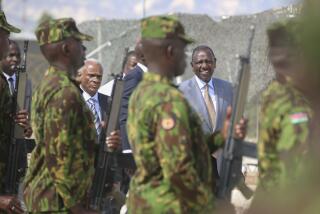Bombing kills 13 in Afghan village
- Share via
Reporting from Kabul, Afghanistan — Assailants set off a bomb Wednesday in a village bazaar in troubled Helmand province, killing 13 people and wounding almost four dozen, provincial officials said.
The bomb, which police said was hidden on a bicycle, targeted farmers who had gathered to receive Western-provided vegetable seeds under a program meant to encourage them to grow crops other than opium poppies.
Taliban militants were suspected in the attack.
The bomber struck in the district of Nahr-e-Sarraj, not far from the scene of a major offensive in February by thousands of U.S. Marines and British and Afghan troops to retake the town of Marja. It underscored the difficulty of that mission’s central aim: to establish security and governance in Helmand, one of the insurgency’s main strongholds.
Helmand’s flourishing drug trade has long had close links with the insurgency, but Afghan and U.S. authorities fear that eradicating poppy crops will alienate villagers. Programs such as the handout of seeds are meant to provide an alternative livelihood for poppy growers, a prospect that angers the Taliban.
Accounts of the blast were initially contradictory, but by the end of the day, Daoud Ahmadi, a spokesman for the provincial governor, had confirmed a death toll of 13. Police said eight of the 45 injured were children.
There was no claim of responsibility for the attack, but the Interior Ministry ascribed it to “the enemies of the country,” a phrase it usually employs to describe the insurgency.
NATO’s International Security Assistance Force said it had sent a patrol to assist Afghan authorities.
The attack came as attention was focused on the North Atlantic Treaty Organization’s next target, the city of Kandahar, the main metropolis of Afghanistan’s south. Kandahar province borders Helmand, and together they are considered to be the Taliban heartland.
Preliminary operations have begun on the outskirts of the city, the country’s second largest, and are expected to intensify this summer.
Adm. Michael. G. Mullen, chairman of the Joint Chiefs of Staff, told reporters in Kabul, the Afghan capital, that about half of the 30,000 additional U.S. troops that President Obama in December ordered to the country had arrived. Most of them are being deployed in the south.
“Kandahar is not Marja; we understand that,” Mullen said. “It is a much bigger challenge and, in that regard, has much greater potential to achieve this goal of reversing the [insurgency’s] momentum.”
More to Read
Sign up for Essential California
The most important California stories and recommendations in your inbox every morning.
You may occasionally receive promotional content from the Los Angeles Times.











